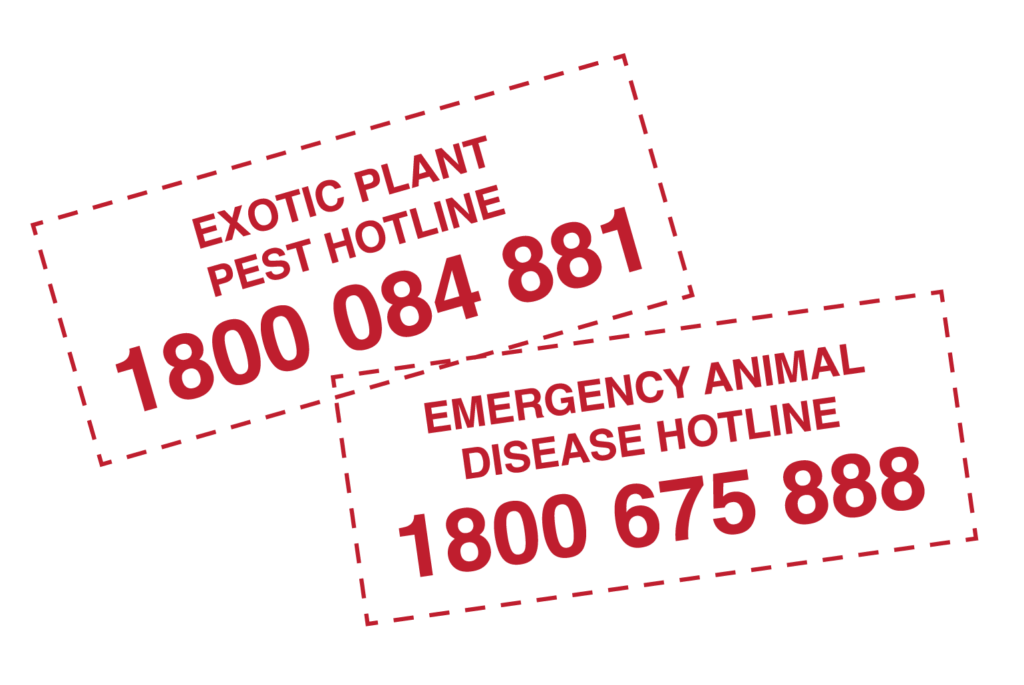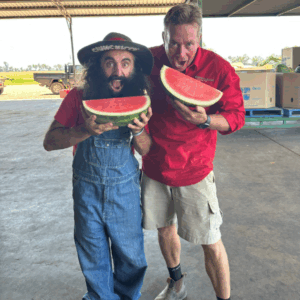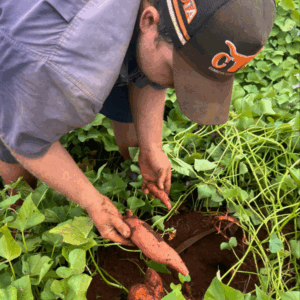
Biosecurity happens near you!
Biosecurity doesn’t just happen on farms or at airports – it happens in your community too! Whether you’re at school, in a garden, or travelling with your family, your actions can help keep pests and diseases out of Australia.
Many farms are close to towns and schools. What happens in your neighbourhood can affect nearby farms. For example:
- bringing fruit with bugs into a new area
- not cleaning boots or vehicles after visiting a farm
- ignoring strange insects or sick plants in your garden.
These small mistakes can lead to big problems. That’s why biosecurity is everyone’s job, not just farmers or scientists!

What does having good biosecurity practices look like where you live?
- Reporting unusual bugs, snails or plants to a parent, teacher, or the biosecurity hotline.
- Checking backyard veggies and pets for signs of pests or sickness.
- Leaving fruit and veg at border bins when visiting states like South Australia or Tasmania.
- Trusting supermarkets to check food safety – biosecurity helps make it happen!
Sustainability and climate change
Good biosecurity also supports a healthy planet and is a way to take care of our Earth so people, animals and plants can live happily now and in the future.
- Less pests = fewer chemicals needed
- Clean soil, air and water
- Healthy crops and animals
- Less food waste
That’s what sustainability looks like–and biosecurity plays a big part in it.
Biosecurity also protects global food trade. Global food trade means countries share and swap food with each other, so everyone can enjoy different kinds of food and have enough to eat. If another country has a dangerous bug or disease, Australia might have to stop bringing their fruit and vegetables into our country. That could make food more expensive or harder to find.
Warmer weather and extreme events like floods or droughts can help bugs and disease spread. Climate change means we need smarter, stronger biosecurity to protect:
- crops
- wildlife
- communities.
We all have a part to play, especially as the world changes.
You can help!
You don’t need to be an expert to protect Australia. Here’s how you can make a difference:
- tell an adult if you see a weird bug or sick plant
- don’t pack fruit or veg when travelling
- clean your shoes and gear before visiting farms or nature parks
- check pets for seeds or insects after walks.
These small actions have a big impact!
Want to level up your biosecurity knowledge so you are prepared to take on those nasty bugs and diseases?
Click on the logos below to learn more about bugs and diseases and how we can all contribute to biosecurity.
Careers in biosecurity
Want to build your biosecurity knowledge? There are heaps of biosecurity-related careers to explore. Some of the careers in biosecurity include:
- scientists who study pests and diseases
- vets who work to keep animals healthy
- drone pilots who scan farmland for problems
- quarantine officers who stop threats at the border
- farmers who use smart strategies to protect their crops and animals.
Whether you’re into science, animals, nature, technology, or the environment – there is a biosecurity role for you. Check out the videos below to hear from people working in biosecurity about what a day in their lives looks like.
Melon farmer: Terry O’Leary
When we are thinking about biosecurity – that’s the key in the word. It’s security, not damage control. Stopping something before it happens is clearly the better option over playing catchup after the event. Complacency about letting something slip through, which can cost your business is a poor practice over the value of prevention and building plans around this. Some things will slip through, however having a reasonable understanding of how to minimise the risk can help minimise the control efforts needed, in many scenarios.

Sweetpotato farmer: Ethan Zunker
Ethan (pictured) and Emily Zunker produce many different cultivars of sweetpotatoes, as well as other annual and perennial crops, on their family farm Zunker Ag, in the heart of Australia’s sweetpotato growing district – Bundaberg, Queensland
Biosecurity important to the sweetpotato industry because viruses, nematodes, and soil-borne diseases are continuously threatening sweetpotato production and quality. For our family farm to sustainably and profitably continue, we need good on-farm and national biosecurity programs, to minimise the impacts of these pests and diseases.
Biosecurity is crucial for the future of banana farming in Australia. It’s our frontline defence against serious pests and diseases and it is essential for the sustainability and profitability of our farming businesses.

Cotton Australia Director: Nigel Burnett
Biosecurity is important as it’s one of our biggest risks. It may be hidden in some ways and not front of mind, but biosecurity can impact us in a massive way. If it slips under the radar the risk to our production system is very high. If we had an incursion, we may not be able to grow cotton in this area and that would have a major impact on the local community.

Australian Banana Growers Council Director: Tayla Mackay
Biosecurity is crucial for the future of banana farming in Australia. It’s our frontline defence against serious pests and diseases and it is essential for the sustainability and profitability of our farming businesses.

Working with detector dogs: A Day in the Life of a Handler
Careers in agriculture, it’s more than just farming!
Managing High-Risk Animals and Plants at the Quarantine Facility
Plant Pathologist
Northern Australia Quarantine (vets)
Working as a plant biosecurity officer
Test your knowledge
Do you think you can help?
Activities for Juniors
